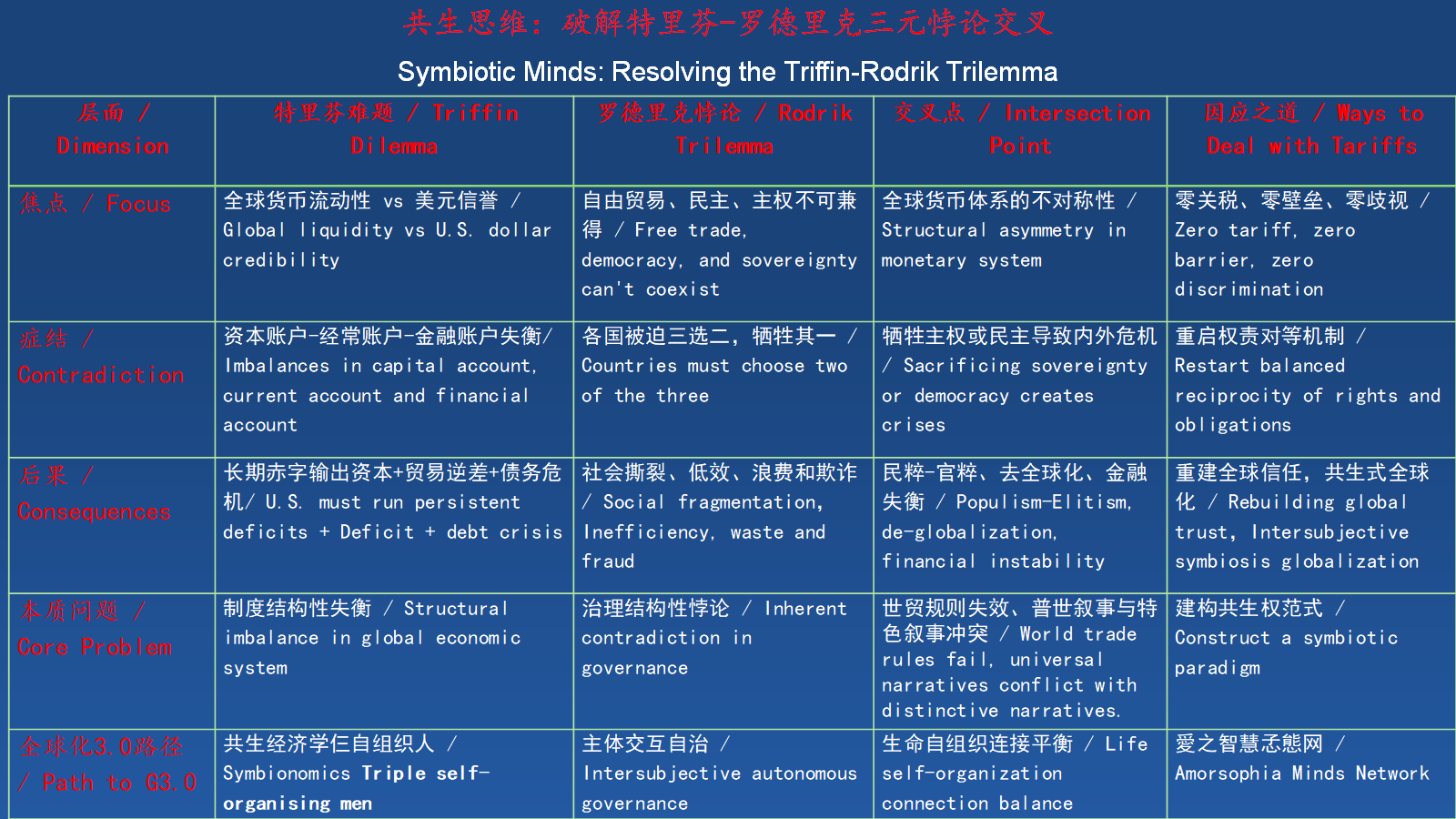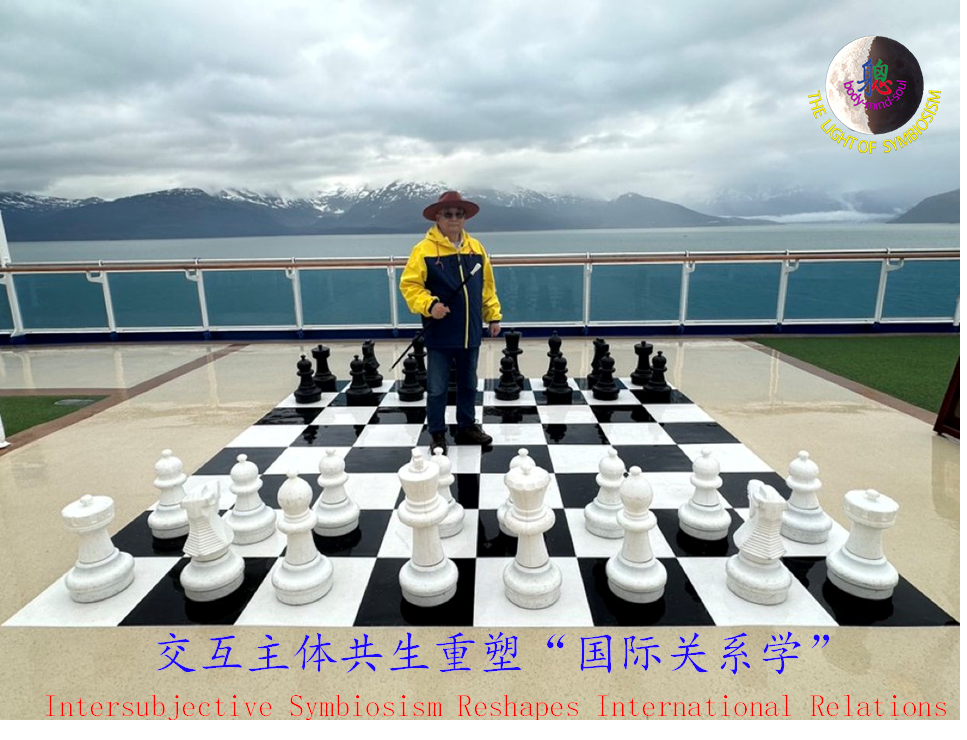《米兰报告》的缺憾:川普对等关税与全球化3.0的责任召唤
《米兰报告》的缺憾:川普对等关税与全球化3.0的责任召唤
The Shortcomings of the Milan Report: Trump’s Reciprocal Tariffs and the Responsibility Awakening of Globalization 3.0
——共生思维:破解“特里芬难题”ד罗德里克悖论”双重张力
—
Symbiotic Minds:Navigating the Dual Tensions of the “Triffin Dilemma” and the “Rodrik Trilemma”
钱 宏(Archer Hong Qian)
Abstract
本文指出美国经济委员会主席斯蒂芬·米兰在《重构全球贸易体系:用户指南》中所提出的路径选择,存在结构性缺憾。该报告旨在破解“特里芬难题”,却忽视了“罗德里克三元悖论”所揭示的制度根本张力——即“自由贸易、国家主权、民主人权”三者不可同时实现。
This article identifies a structural deficiency in the pathway proposed by Stephen Milan, Chairman of the U.S. Council of Economic Advisors, in Rebuilding the Global Trade System: A User’s Guide.While the report aims to resolve the “Triffin Dilemma,” it overlooks the deeper institutional tension exposed by the “Rodrik Trilemma”—namely, that free trade, national sovereignty, and human rights-based democracy cannot be simultaneously fulfilled.
这种制度路径上的难题和悖论,正是导致经济全球化信任结构内耗崩解的死结。
These dilemmas and paradoxes in the institutional pathway constitute the deadlock behind the internal erosion of trust within economic globalization.
川普的“对等关税”政策,被误读为单边行动主义,实则触及结构性不对等的根源。他不是终结者,而是变量;不是标准答案,而是揭示问题的通道开启者。
Donald Trump’s policy of “reciprocal tariffs” has been widely misread as a form of unilateral activism, while in fact it addresses the root of structural asymmetry.
He is not a terminator, but a variable—not a perfect solution, but a trigger that opens the path toward confronting the deeper problems.
作者主张,全球化3.0必须从国家中心与孞托结构剥离,转向以“生命自组织连接平衡”为基础的交互主体共生秩序,并以愛之智慧孞態网作为社区生活方式创新文明通道基础设施。
The author argues that Globalization 3.0 must detach from nation-centered and Trust-based structures, and move toward an intersubjective symbiotic order grounded in the dynamic balance of self-organizing life systems. The Amorsophia Minds Network (愛之智慧孞態网) is proposed as the infrastructural foundation for community-based lifestyle innovation and civilizational transformation.
MAGA的真实内涵,是人类文明通道更新的示范性实验,而非技术优化或另一种特权力更替。
The true significance of MAGA lies not in technical optimization or the substitution of power elites, but in its demonstrative function as a transitional experiment for civilizational renewal.
Table of Contents
一、被高估的破解:米兰报告的“单脚立论”
I. The Overestimated Solution: The One-Legged Logic of the Milan Report
二、全球化2.0的制度陷阱:特里芬难题与罗德里克悖论
II. The Institutional Trap of Globalization 2.0: The Triffin Dilemma and Rodrik Trilemma
三、误读川普:“对等关税”不是“关税战”
III. Misreading Trump: “Reciprocal Tariffs” Are Not a Trade War
四、全球化3.0的前提:从信托架构转向生命共生架构
IV. The Premise of Globalization 3.0: From Trust Architecture to Life-Based Symbiosis
五、川普的有限任期,不等于历史的有限作用
V. Trump’s Limited Term Does Not Mean Limited Historical Impact
六、破解特里芬-罗德里克三元悖论:共生思维的路径
VI. Resolving the Triffin-Rodrik Trilemma: A Symbiotic Minds Approach
七、从三元悖论到共生重构
VII. Conclusion: From Trilemma to Symbiotic Reconstruction
八、技术指南无法取代文明转型的哲学自觉
VIII. Technical Manuals Cannot Replace the Philosophical Awakening of Civilizational Transformation

一、被高估的破解:米兰报告的“单脚立论”
I. The Overestimated Solution: Milan’s “One-Legged Argument”
美国经济委员会主席斯蒂芬·米兰(Stephen Milan)在其《重构全球贸易体系:用户指南》中,试图以破解“特里芬难题”(Triffin Dilemma)为立足点,重建全球货币流通与信任体系。这一努力可谓精致而大胆,但根基却并不牢固。
Stephen Milan, Chairman of the U.S. Economic Committee, in his Rebuilding the Global Trading System: A User’s Guide, attempts to reconstruct the global monetary and trust system by addressing the “Triffin Dilemma.” This effort is both refined and bold, but its foundation is unstable.
他忽视了“罗德里克三元悖论”(Rodolrik’s Trilemma)所揭示的制度底线张力——即全球经济一体化、国家主权与民主政治三者不可兼得。在全球化2.0所代表的资本主导逻辑中,各国主权和政策空间被不断压缩,民主人权沦为空壳,最终将导致全球治理的信任崩塌。
He overlooks the institutional tension revealed by “Rodrik’s Trilemma”—that global economic integration, national sovereignty, and democratic governance cannot coexist fully. Under the capital-dominated logic of Globalization 2.0, national sovereignty and policy space are continuously compressed, democracy becomes hollow, and global governance suffers a collapse in trust.
米兰的分析之所以显得“精英化”而难以落地,正因为他仍然拘泥于美国信用机制与Trust集体治理逻辑,而没有直面全球秩序演变所需的价值转型与生命组织机制。
Milan’s analysis appears “elite-oriented” and lacks practical traction precisely because he remains confined within the U.S.-centric credit mechanism and trust-based governance logic, without confronting the value transformation and life-based organizational mechanisms needed for a new global order.
二、全球化2.0的制度陷阱:特里芬难题与罗德里克悖论
II. The Institutional Trap of Globalization 2.0: The Triffin Dilemma and Rodrik’s Paradox
破解“增长的极限”,不能只看经济现象,更要触及制度根源。在全球化2.0构造的现代秩序中,两个关键悖论——“特里芬难题”与“罗德里克三元悖论”——构成了全球体系失衡的底层张力。
To resolve the “limits to growth,” one must go beyond economic appearances and touch the roots of institutional design. The modern order shaped by Globalization 2.0 is entangled in two critical paradoxes—the Triffin Dilemma and Rodrik’s Trilemma—that form the underlying tension of global imbalance.
特里芬难题:强势美元的自我蚕食机制
1. The Triffin Dilemma: The Self-Eroding Mechanism of the Dollar
由比利时经济学家罗伯特·特里芬提出,指出:当某一国家(如美国)的货币成为全球储备货币时,它必须长期输出赤字(美元)以满足全球流动性需求。但这样反过来又侵蚀了该国自身的财政与产业基础,最终削弱其货币信用。造成“经常账户端与金融账户端”背离。
Proposed by Belgian economist Robert Triffin, this dilemma reveals that when a national currency (e.g., the U.S. dollar) serves as a global reserve currency, the issuing country must consistently run deficits to provide sufficient liquidity. But this in turn undermines its own fiscal and industrial base, eroding its monetary credibility and decoupling the current and capital accounts.
例如,2024年美国货物贸易赤字高达1.2万亿美元,制造业就业持续流失,而金融科技行业利润激增,造成社会阶层两极分化。
For example, in 2024, the U.S. goods trade deficit reached $1.2 trillion. While manufacturing jobs continued to decline, profits in finance and tech soared, deepening socioeconomic polarization:
金融业从业者平均年薪突破15万美元,
Financial industry average salary exceeded $150,000,
制造业工人仅约5万美元,
Manufacturing workers earned barely $50,000,
基尼系数升至0.48,社会撕裂日趋严重。
The Gini coefficient rose to 0.48, with growing social division.
这正是“特里芬难题”的现实体现:一边输出超值美元,一边蚕食国内实质经济。
This is the Triffin Dilemma in practice: while exporting overvalued dollars, the U.S. economy cannibalizes its real domestic base.
罗德里克悖论:全球、主权、民主不可兼得
2. Rodrik’s Trilemma: Globalization, Sovereignty, and Democracy—An Impossible Trinity
哈佛经济学家丹尼·罗德里克提出的“三元悖论”指出:全球“自由贸易、国家主权和民主人权”三者无法同时实现,只能三选二。
Harvard economist Dani Rodrik’s “Trilemma” posits that free trade, national sovereignty, and democratic rights cannot all be realized simultaneously. One must choose two at the expense of the third:
若要自由贸易与民主人权,必须削弱国家主权(如欧盟);
To preserve free trade and democracy, national sovereignty must be weakened (e.g., the EU);
若要国家主权与自由贸易,则必须牺牲民主人权(如中国);
To protect sovereignty and trade, democracy must be sacrificed (e.g., China);
若要民主人权与国家主权,必须限制自由贸易(如美国)。
To sustain democracy and sovereignty, trade must be restricted (e.g., the U.S.).
全球化2.0的路径选择是“全球化+表观主权”,但民主机制被架空,多边协议、金融资本、国际组织往往绕过民选政府,直接定义国家政策空间。这种“制度失联”日益将人民排除在决策结构之外,成为民粹主义崛起的温床。
Globalization 2.0 pursued “global trade + nominal sovereignty,” yet hollowed out democratic institutions. Multilateral agreements, financial capital, and international organizations increasingly bypass elected governments, directly shaping national policy space. This “institutional dislocation” excludes the people from decision-making, fueling the rise of populism.
从制度悖论走向“增长的极限”
3. From Institutional Paradoxes to the Limits of Growth
当特里芬难题与罗德里克悖论相互交缠,就构成了全球化2.0时代的制度死结,使得“增长本身”变得扭曲、空洞、不可持续。这一危机体现为三大阈值:
When the Triffin Dilemma and Rodrik’s Trilemma intertwine, they form a structural deadlock—Globalization 2.0’s system failure—rendering growth itself distorted, hollow, and unsustainable. This crisis reveals three critical thresholds:
生态阈值:1972年《增长的极限》报告指出资源环境不可无限透支。2020年全球碳排放达360亿吨,生态债失控。
Ecological: The Limits to Growth report (1972) warned against infinite resource extraction. By 2020, global carbon emissions reached 36 billion tons, with ecological debt spiraling out of control.
社会阈值:美国1950-2000年GDP增长三倍,国民幸福感却几乎未变,经济发展与人类福祉渐行渐远。
Social: Between 1950–2000, U.S. GDP tripled, yet national happiness levels stagnated. Economic growth drifted away from human well-being.
经济阈值:日本“失去的三十年”,表明当边际效益递减接近零,增长不再带来希望,而是加剧负担与焦虑。
Economic: Japan’s “Lost Three Decades” show that when marginal returns approach zero, growth yields anxiety rather than hope.
三、误读川普:“对等关税”不是“关税战”
III. Misreading Trump: “Reciprocal Tariffs” Are Not a Trade War
正因米兰报告延续了信托型秩序的视角,使得川普提出的“对等关税”轻易被误读为“关税战”或“单边主义”。
Because Milan’s report continues the lens of trust-based order, Trump’s call for “reciprocal tariffs” is easily dismissed as a protectionist “trade war” or unilateralism.
但若换一个价值坐标来看,川普的“对等关税”所挑战的,并不是自由贸易本身,而是“非对等结构”背后的制度性压迫与盘剥机制。他用“对等公平”作为重新谈判的通用语,打破特权国家与被特权国家之间的隐性壁垒,唤起全球经济秩序中被边缘者的自组织觉知。
But from a different value framework, Trump’s tariff stance challenges not free trade per se, but the systemic inequality and extractive mechanisms behind asymmetric trade structures. He invoked “reciprocity” as a common language to renegotiate global rules, breaking implicit barriers between privileged and marginalized nations, and awakening grassroots awareness of structural injustice.
换言之:川普之举,是要让国家重新成为其国民生命力的承载体,而不是资本的殖民地。
In other words, Trump’s goal is to re-establish the nation-state as a vessel of its people’s vitality—not a colony of global capital.
四、全球化3.0的前提:从信托架构转向生命共生架构
IV. The Premise of Globalization 3.0: From Trust Architecture to Life-Based Symbiosis
米兰报告真正的盲点,是没有跨出“美国立场”进入“世界共生体”的思维维度。他仍试图在信托逻辑下通过更优机制来提升效率与公平,却未意识到:全球化2.0的制度天花板已至,必须进行范式转化。
The true blind spot in Milan’s report is its failure to shift from a “U.S. perspective” to a worldview of interdependent co-existence. He remains committed to refining trust-based mechanisms to enhance efficiency and fairness, unaware that the institutional ceiling of Globalization 2.0 has already been reached. What is needed is not a new form of hegemony, but a paradigm shift.
这一转化,不是另一种霸权替代,而是迈向基于“生命自组织连接平衡”的全球化3.0:
That shift is Globalization 3.0, grounded in the self-organizing, dynamically balanced connectivity of life:
主体不再是国家机器与国际信托组织,而是交互中的生命个体与社区网络;
The primary actors are no longer nation-states or trust organizations, but life forms and community networks in intersubjective interaction.
合作不再依赖中心化契约与硬性规则,而源于“仨愛结构”交互主体共生的责任与自发性重构;
Cooperation arises not from centralized contracts or rigid rules, but from the triadic love structure of mutual responsibility and spontaneous regeneration.
权利与义务的认定,不再由权力结构赋予,而由“適宜性”与“通律性”在时空意间中动态生成。
Rights and obligations are no longer bestowed by power structures, but emerge dynamically from “suitability” and “universal ethical resonance” within spatio-temporal interspace.
五、川普的有限任期,不等于历史的有限作用
V. Trump’s Limited Term Does Not Mean Limited Historical Impact
如果以“美国立场”看,川普任期内的确寸步维艰,遭遇重重阻力,甚至不被理解。但若从“美国责任与文明使命”出发,川普却正处在为全球化3.0开路的历史拐点上。
From a purely U.S. standpoint, Trump’s presidency was fraught with setbacks and resistance. But from the lens of “America’s global responsibility and civilizational mission,” he stands at a pivotal moment of transition toward Globalization 3.0.
他所“发动”的并非一次政策性的政权更替,而是一场结构性秩序的价值反转:
His efforts were not a policy change within the system, but a value reversal of the structure itself:
不是权力中心的更换,而是话语起点的改变;
Not a change in power holders, but in the origin of discourse;
不是技术优化的问题,而是文明自省与范式突围;
Not a matter of technical optimization, but a civilizational self-reflection and paradigm breakthrough;
不是为了“赢”,而是为了“通”:打通被垄断的经济通道、语言通道、共识通道。
Not about “winning,” but about opening: opening the monopolized channels of economics, language, and consensus.
这也解释了他为何选出一个“既富有又年轻”的执政团队——他们未必是旧制度的延续者,却可能成为新文明的奠基者。
This also explains why he assembled a leadership team that is “wealthy and young”—not necessarily heirs of the old regime, but potential founders of a new civilization.
六、破解特里芬-罗德里克三元悖论:共生思维的路径
VI. Resolving the Triffin-Rodrik Trilemma: A Symbiotic Minds Approach
当今全球秩序的结构性危机,并非孤立理论命题的简单叠加,而是一个深层交织的“特里芬-罗德里克三元悖论”——货币失衡(特里芬难题)、治理矛盾(罗德里克悖论)与系统性不公在此交汇,共同动摇了全球化2.0的根基。
The structural crisis of today’s global order is not a mere collection of isolated challenges but a deeply interwoven "Triffin-Rodrik Trilemma"—a triadic conflict where monetary imbalances (Triffin Dilemma), governance contradictions (Rodrik Trilemma), and systemic inequity converge to destabilize Globalization 2.0.
特里芬难题揭示了以美元为锚的全球货币体系的自我蚕食逻辑:美国必须持续输出赤字以提供全球流动性,但这削弱了其经济基础和美元信誉,加剧了全球金融失衡。与此同时,罗德里克三元悖论指出了自由贸易、国家主权和民主人权之间的不可调和张力——各国只能三选二,导致治理失效和社会撕裂。这两个悖论的交叉点形成了第三元:系统性不公,全球贸易和货币规则不成比例地偏向特权国家,助长了民粹主义、去全球化和金融不稳定。
The Triffin Dilemma exposes the self-eroding nature of the dollar-based global monetary system: the U.S. must run persistent deficits to provide liquidity, yet this undermines its economic base, erodes dollar credibility, and exacerbates global financial imbalances. Simultaneously, Rodrik’s Trilemma highlights the irreconcilable tension between free trade, national sovereignty, and democratic rights—nations must sacrifice one to achieve the other two, leading to governance failures and social fragmentation. The intersection of these dilemmas creates a third element: systemic inequity, where global trade and monetary rules disproportionately favor privileged nations, fueling populism, de-globalization, and financial instability.
这一“特里芬-罗德里克三元悖论”体现为一种双重异化——货币霸权与民主空虚并存。全球南方面临为维持美元体系而牺牲主权的困境,美国则在输出赤字的同时,遭遇内部阶层分裂和民主失灵,例如2024年美国贸易赤字高达1.2万亿美元,基尼系数达0.48。下表总结了这一三元悖论及其共生解决路径:
This "Triffin-Rodrik Trilemma" manifests as a dual alienation—monetary dominance paired with a democratic vacuum. The Global South sacrifices sovereignty to sustain the dollar system, while the U.S. faces internal class divides and democratic dysfunction, as seen in the 2024 trade deficit of $1.2 trillion and a Gini coefficient of 0.48. The table below outlines this trilemma and the symbiotic pathway to resolve it:

川普的“对等关税”在这一三元悖论中充当了颠覆性变量,挑战了不公平的沉默结构。通过优先考虑对等性而非全球信托机制,川普的政策为权利与责任的重新配置开辟了道路,为全球化3.0奠定了基础——这一范式以交互主体共生为核心,而非霸权控制。
Trump’s "reciprocal tariffs" serve as a disruptive variable in this trilemma, challenging the silent structures of inequity. By prioritizing reciprocity over global trust mechanisms, Trump’s policy opens a pathway to renegotiate rights and responsibilities, paving the way for Globalization 3.0—a paradigm rooted in intersubjective symbiosis rather than hegemonic control.
七、从三元悖论到共生重构
VII. Conclusion: From Trilemma to Symbiotic Reconstruction
特里芬-罗德里克三元悖论表明,全球化2.0已耗尽其制度潜力。特里芬难题揭示的货币信任枯竭、罗德里克悖论凸显的主权与民主裂痕,以及由此产生的系统性不公,共同要求一场文明转型。米兰报告所提出的基于信托框架的技术解决方案无法应对这一三元危机。我们必须转向全球化3.0,以交互主体共生为核心。
The Triffin-Rodrik Trilemma underscores that Globalization 2.0 has exhausted its institutional potential. The monetary exhaustion revealed by the Triffin Dilemma, the democratic-sovereignty rift highlighted by Rodrik’s Trilemma, and the resulting systemic inequity demand a civilizational shift. Technical solutions within a trust-based framework, as proposed in Milan’s report, cannot address this triadic crisis. Instead, we must transition to Globalization 3.0, centered on intersubjective symbiosis.
这一转型包括:
This shift involves:
摒弃单一国家货币作为全球锚定点,构建以价值共识为基础的多元计价体系;
Abandoning the single-nation currency anchor for a pluralistic, value-based monetary system that reflects global consensus.
将生命健康、生态适宜和人类尊严,而非资本效率,作为经济增长的核心指标;
Prioritizing life-health, ecological fitness, and human dignity over capital efficiency as the core metrics of economic progress.
用社区、个人和组织间的多主体协同网络取代国家间的零和博弈,通过动态治理实现共生,依托愛之智慧孞態网实现这一目标。
Replacing zero-sum, state-centric competition with dynamic governance through multi-actor networks of communities, individuals, and organizations, facilitated by the Amorsophia Minds Network.
川普的对等关税虽非完美解法,却标志着一次象征性的价值断裂——打破全球化2.0不公平结构的机会。它催化了“三元悖论破解×文明突围”的关键时刻,召唤每一个人和组织参与这场共生转型。我们是否准备好通过共生思维(Symbiotic Minds),重建一个以公平、信任和互助责任为核心的全球秩序?
Trump’s reciprocal tariffs, while not a perfect solution, mark a symbolic rupture—an opportunity to break from the inequitable structures of Globalization 2.0. They catalyze a moment of "trilemma resolution × civilizational breakthrough," inviting every individual and organization to participate in this symbiotic transformation. Are we ready to rebuild the world through Symbiotic Minds, fostering a global order where equity, trust, and mutual responsibility prevail?
八、技术指南无法取代文明转型的哲学自觉
VIII. Technical Manuals Cannot Replace the Philosophical Awakening of Civilizational Transformation
米兰报告以“用户指南”的姿态,试图以技术精巧化解系统困局,然而却始终未触及那个最关键的问题:制度之下的哲学缺位,信任之上的共生断裂。
Milan’s “user guide” approach tries to resolve structural dilemmas through technical finesse, but never touches the real core: the absence of philosophy beneath institutions, and the rupture of symbiosis above trust.
在这样的结构性环境中,全球化2.0并非自然老去的体制,而是走向崩塌的逻辑必然。特里芬难题与罗德里克悖论,正构成一体两面的制度闭环:一边是全球金融秩序的内耗自蚀,一边是国家主权与民主人权的结构性剥离,逼迫整个人类文明不得不向更高阶的交互秩序范式——全球化3.0——迈进。
In this context, Globalization 2.0 is not aging gracefully—it is collapsing logically. The Triffin Dilemma and Rodrik Trilemma are two faces of the same structural loop: on one side, the global financial order is eroding from within; on the other, national sovereignty and democratic human rights are structurally torn apart. This dual crisis compels humanity toward a higher-order interactive paradigm—Globalization 3.0.
而川普的出现,并非一个完美无瑕的“理想解”,而是那个打破旧秩序“沉默结构”的不合逻辑变量:他揭开了旧制度的遮羞布,也撞开了通往新文明通道的那扇门。
Trump’s emergence is not a perfect solution, but an illogical variable that shattered the silence of the old order: he ripped away its veil of decorum, and cracked open the door to a new civilizational passage.
无论你愛他还是恨他,都不得不回应那个已经到来的问题:我们是否准备好,用交互主体共生的方式,重建这个世界?
Whether one loves or loathes him, we are all now forced to confront the same inevitable question: Are we ready to rebuild this world through the path of intersubjective symbiosis?
